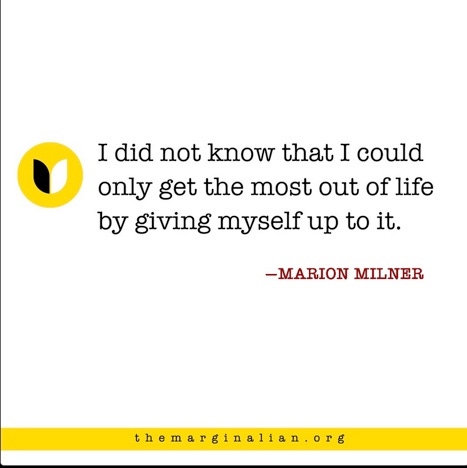Surrender as Action Verb
I’ve been thinking of the idea of surrender lately—surrender as a way to tap into deeper layers of creativity, but also surrender as an approach to life.
Perhaps it’s because I’m in that strange land of being in between projects. I know I could easily choose one of my half-finished novels and try to resuscitate it, but I feel like I’d be willing it into life. None of my old dusty novels are truly calling me. I’d just be grinding them forward.
I’ve spoken to several authors on my Write-minded podcast who have inspired me by what I’ll call their “purposeless” writing. Lan Samantha Chang, Rachel Khong, and Paolo Bacigalupi all followed a process of writing aimlessly, writing just to write, writing to meander, and in that process of free writing, the gravity of a story began to pull them in, and soon they found that they’d essentially discovered their story by accident.
Or it discovered them. It had accumulated randomly. Without being willed. They simply surrendered to the mysterious forces of their imaginations.
“Surrender” is a word soaked with negative connotations. To surrender is to be weak. You surrender when you’re defeated, when you have no more will to fight, when you lack strength and determination. Surrendering can seem like a character flaw, especially in victory-at-any-cost America. Never surrender, never give up. Persist, resist, insist.
But surrendering isn’t necessarily about giving up, or weakness, or passivity. The act of resignation, of ceding, can be an act of opening oneself up, of receptivity. It can be as brave and bold as any victory. Surrender is a form of trust. It’s a pathway to humility, an embrace of uncertainty.
It’s a paradox: a collapse that invites fullness. Sometimes you have to give up power to gain power. Sometimes you have to lose the argument to win the argument (“winning” meaning not that you’re the victor but that the argument is peacefully resolved). And that in turn changes the rules of power and the nature of winning.
Surrender is an action verb
“The creative self,” wrote the poet Jane Hirshfield, “asks the surrender of ordinary conceptions of identity and will for a broader kind of intimacy and allegiance.”
In Hirshfield’s terms, surrender becomes a radical, transformative act. A redefinition of ego and will and success.
When we surrender ourselves to our art, we allow ourselves to soften. Surrender invites us to give ourselves up to something larger, to meld with wonder and awe. Surrender creates intimacy and expansiveness at the same time. It sparks curiosity, exploration. It’s the equivalent of going to sleep: by sinking into an unconscious state, we allow dreams to fill us. We give up trying to change and control things. The rigidities of expectations, desires, and aspirations melt away.
“I think surrender should be an active verb,” said the musician Brian Eno. He said that we generally think of surrender as being a passive state of submission, but if we think of it as being an active choice, a word of passion, then it’s transformed. Eno says that when you surrender, “you know you’re not in control anymore and that makes you more alert.”
Take surfing. The surfer doesn’t try to control the wave, but to balance control with surrender, because it’s only with surrender that the surfer can feel the wave and be alert to it.
Eno believes that we have a human need for surrender so strong that it’s at the center of religion and art. It’s at the center of love, as well, for love only succeeds with mutual surrender. Surrender dissolves the ego so that you can serve something beyond yourself. Surrender creates new spaces of being.
Good stories look for contours and then follow gravity.
Think what would change if you allowed yourself to surrender in a conversation. What if you committed to listening, to let another’s words and spirit rise up and take you instead of focusing on your point of view, your needs. What if you decided not to try to win the next argument you find yourself in? What if you decide not to be the star of the conversation?
The same goes for creating art. You often hear a writer comment on how the characters of their story took over at a certain point. What they’re saying is that they surrendered to the story. They followed the scents of the story through the jungle instead of taking a machete to forge a trail they mapped out. The outline, the plan—the victory that’s been designed—succumbs to something greater, something truer.
“All of our reasoning ends in surrender to feeling,” wrote Blaise Pascal.
Or it begins again, but better. Reason too easily becomes stiff, following well-hewn pathways, seeking to be right—seeking to own and control—but reason is best when it’s flexible, not seeking to determine, but to find.
The word “surrender” actually started as a legal term in the 15th century—to yield, to give up possession to another. Surrender isn’t about ownership. It’s about relinquishment.
The challenge of every artistic endeavor is to remain supple. I once decided to sit by a stream and simply watch it for an hour without doing anything else. It was fascinating to watch the water slither around rocks and sticks and pass into other spheres. The stream knew only to keep flowing.
Stories should bend in similar ways, wending around and over obstacles, not getting snagged by the way things are supposed to be. Good stories look for contours and then follow gravity. If stories stiffen, they stop.
Surrender creates a softness that holds openness, release. With softness, there is grace.
Today’s challenge: How can you approach your work with a lithe and agile mind? How can you remain nimble when an unexpected obstacle presents itself? How can you keep flowing?
I’m available for book coaching and editing!
I’ve written extensively about creativity in numerous books and articles, talked with 300 writers on my podcast, Write-minded, led the largest writing event in the world, National Novel Writing Month, and …. well, I’ve just immersed myself in all things writing for a lifetime, and I love, love, love working with writers to tell their stories.
Contact me to find out more about my one-on-one work with writers.
Because a quote
“Surfing is attitude dancing.”
—Gerry Lopez
Because a photo
On the topic of surrender, I took a train from Berkeley, California, to Osceola, Iowa, last week. 48 hours. I read a lot, but mainly I let my thoughts drift with the landscape, peeking into people’s back yards, getting lost in the immensity of the land.
I barely said a word. But I got a lot of ideas.






Well damn. Sign me up for more of this. So very well penned and articulated.
"The stream only knew to keep flowing." Just beautiful.
I wonder what further surrender would look like in my life. This essay is so Sufi and I love it. Bookmarked for sure.
Good stories look for contours and follow gravity.....Brilliant